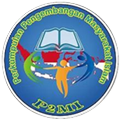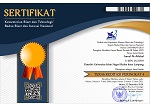KINERJA DA’I NAGARI DALAM MENINGKATKAN KEHIDUPAN BERAGAMA MASYARAKAT ISLAM DI KABUPATEN PASAMAN BARAT
Abstract
The West Pasaman Regency government hopes that Da’i Nagari can improve the religious life of the Muslim community in order to achieve the vision and mission. The objectives of this study are as follows: (1) to reveal the performance process of Da’i Nagari; (2) reveal the role of Da’i Nagari; (3) reveal the evaluation of Da’i Nagari; and (4) reveal the inhibiting factors of Da’i Nagari in improving the religious life of the Muslim community in West Pasaman Regency. The research subjects consisted of 6 Da’i Nagari people. Each nagari was taken by 2 Da’i Nagari who served in Nagari Koto Baru, Kapa and Lingkuang Aua. The 3 nagari are inhabited by Javanese, Minang and Batak (JAMBAK) tribes. Data were collected through observation, interviews and documentation. The results of this study indicate, the process of improving the religious life of the Muslim community in West Pasaman Regency is related to how Da’i Nagari’s efforts to empower the community through religious programs. The materials given by Da’i Nagari to the community were selected according to the conditions of the people in West Pasaman Regency. Empowerment as a learning process is carried out by Da’i Nagari by teaching children in TPA. Da’i’s efforts to empower the community through religious programs such as sermons, lectures, TPA education, TPA guidance, and so on. Da’i Nagari also acts as a facilitator, educator, messenger and skills. Evaluation of the improvement of the religious life of the Muslim community is carried out by making comparisons between the data and facts obtained in the field, then reported to the nagari then the nagari party provides a report to the sub-district and to the welfare area. This report aims to assess the extent to which the activity process has been carried out. The inhibiting factor is the fanaticism of the community towards one mazhab and the availability of a limited budget and the lack of community participation in accepting the empowerment carried out by Da’i Nagari.
Keywords
Full Text:
PDFReferences
Husaini. Usman, Metodologi Penelitian Sosial, Jakarta: Bumi Aksara, 2009
Jim Ife dan Frank Tesoriero, Cummunity Development; Alternatif Pengembangan Masyarakat di Era Globalisasi, Yogyakarta: Pustaka Pelajar, 2016
Lexy J. Moleong, Metodologi Penelitian Kualitatif, Bandung: Remaja Rosdakarya, 2009
Muhtadi dan Tantan Hermansah,Manajemen Pengembangan Masyarakat Islam, Jakarta: UIN Jakarta Press, 2013
Totok Mardiaknto, Poerwoko Soebiato, Pemberdayaan Masyarakat Dalam Perspektif Kebijakan Publik, Bandung: Alfabeta, 2015
Imam dan Tobroni, Metodologi Penelitian Sosial-Agama, Bandung: Remaja Rosdakarya, 2001
Soetomo, Strategi-strategi Pembangunan Masyarakat, Yogyakarta: Pustaka Pelajar, 2008
Martiam, Fanatisme, Ektremisme, dan Penyingkiran Ciri Antropologis Pengetahuan, Jurnal Kawistara is Published By The Graduate School, Universitas Gadjah Mada
Nawawi Hadari, Administrasi Personel Untuk Meningkatkan Produktivitas Kerja, Jakarta: Haji Masaagung, 1990
DOI: http://dx.doi.org/10.24042/ijpmi.v13i2.6702
Refbacks
- There are currently no refbacks.
Jurnal Ijtimaiyya is licensed under a Creative Commons Attribution-ShareAlike 4.0 International License.






1.png)
11.png)
.png)


